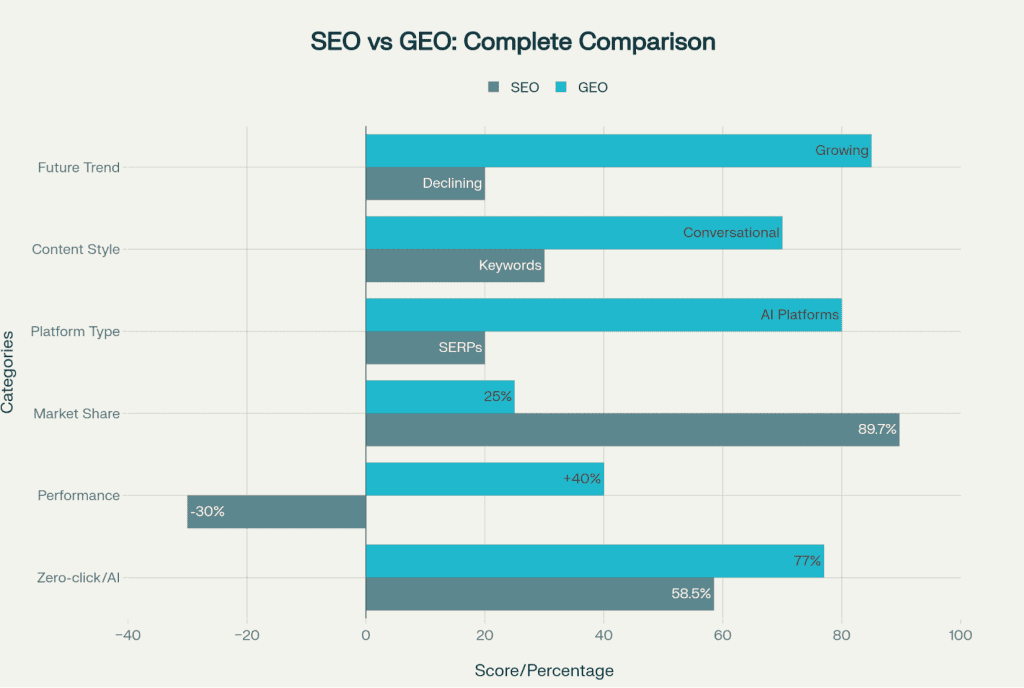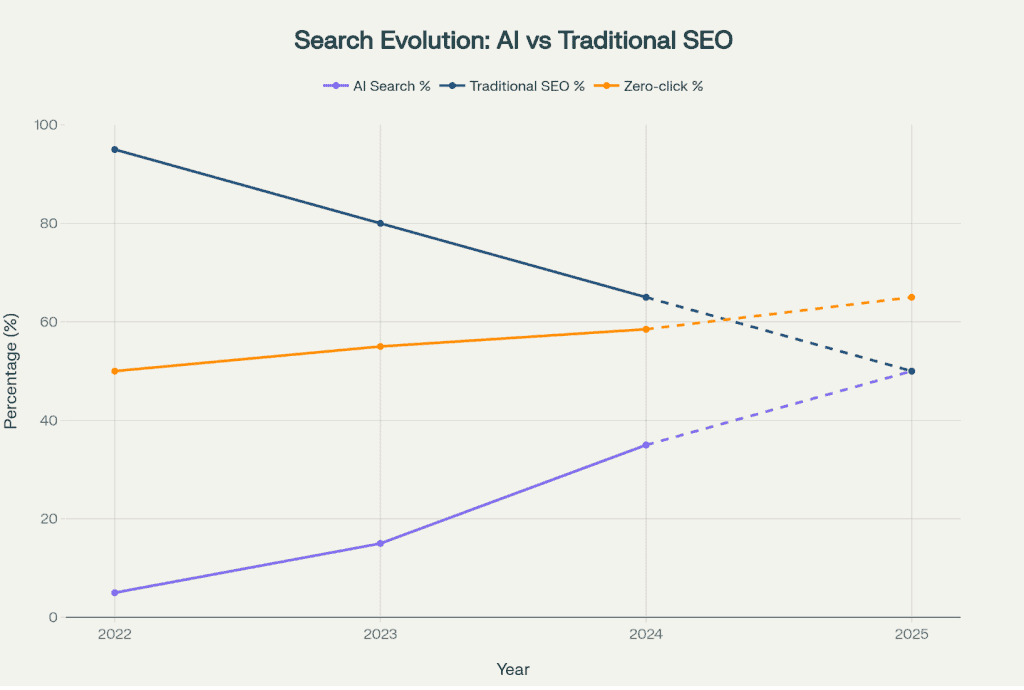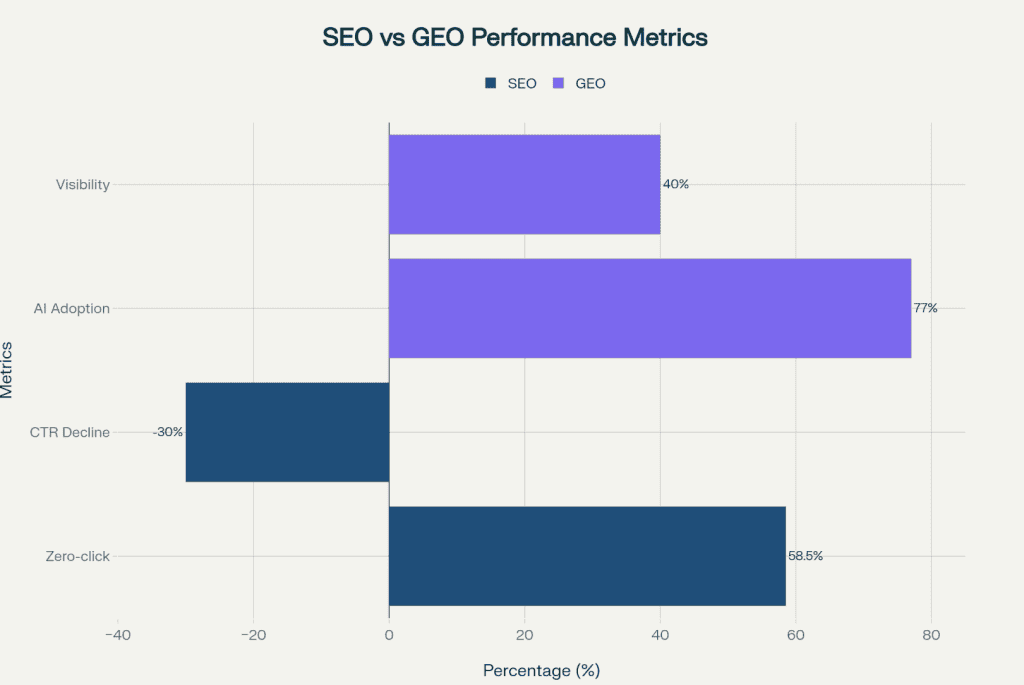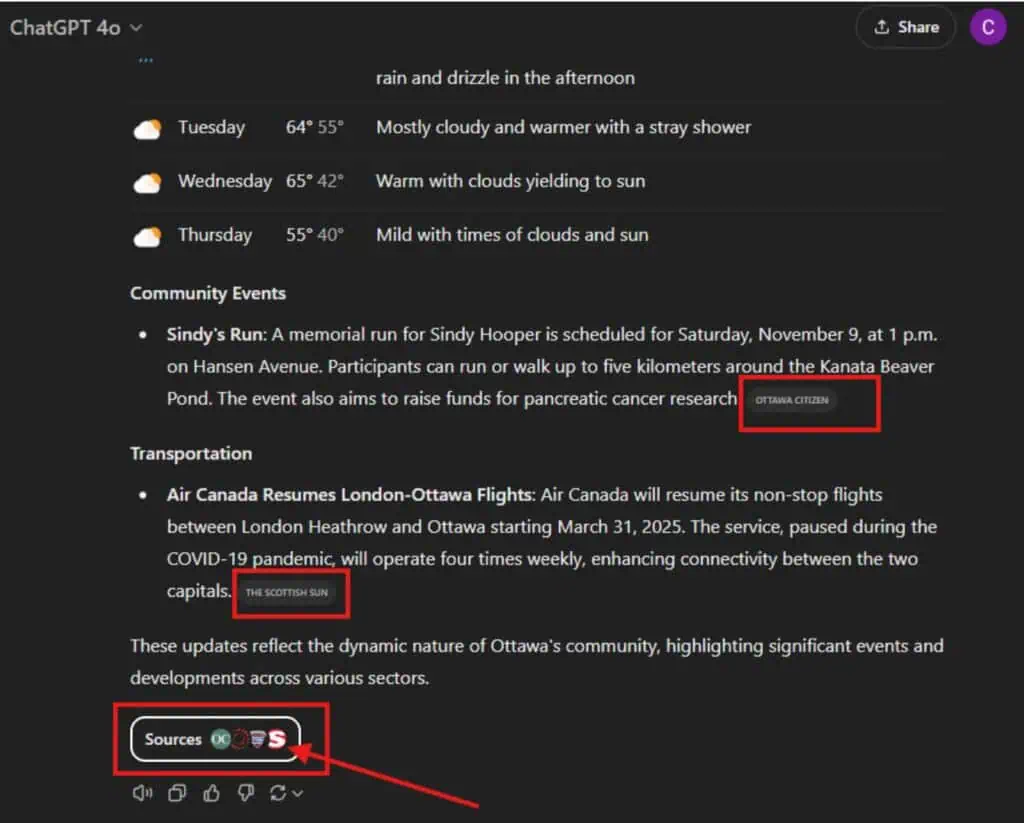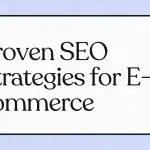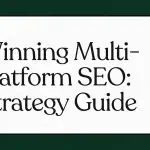Summary
The rise of Generative Engine Optimization (GEO) marks a pivotal shift in digital marketing as AI search platforms like ChatGPT, Perplexity, and Google’s AI Overviews redefine how users discover information. Traditional Search Engine Optimization (SEO) remains essential but now coexists with GEO strategies focused on citations, structured data, and AI comprehension. Businesses adopting a hybrid SEO–GEO strategy gain visibility across both organic search results and AI-generated answers, securing long-term digital dominance in 2025 and beyond.
Last week, Sarah, a digital marketing manager at a thriving e-commerce company, noticed something alarming. Despite maintaining their #3 Google ranking for their main keyword, their organic traffic had plummeted by 35% over six months. Google’s AI Overviews were now answering customer questions directly in search results, making clicks to her website nearly obsolete.
Across industries, businesses are grappling with a fundamental shift that’s reshaping how people discover information online. Welcome to the era where GEO vs SEO is a survival strategy.
If you’ve been wondering whether traditional search engine optimization still works, or if you should be pivoting to generative engine optimization, you’re asking the right questions. But here’s the thing: the answer isn’t black and white, and the stakes have never been higher.
In this comprehensive guide, we’ll dissect the SEO vs GEO differences, explore how AI search trends 2025 are revolutionizing digital discovery, and help you determine which strategy—or combination of strategies—will keep your business visible in an AI-powered world.
What is GEO vs SEO: Understanding the Fundamental Shift
Let’s start with the basics, because understanding GEO vs SEO requires grasping how fundamentally different these approaches are.
Search Engine Optimization (SEO) is the time-tested practice of optimizing your website and content to rank higher in traditional search engine results pages (SERPs). Think Google, Bing, Yahoo, the classic “10 blue links” we’ve all grown accustomed to. SEO focuses on keywords, backlinks, technical optimization, and creating content that search engine algorithms deem worthy of high rankings.
Generative Engine Optimization (GEO), on the other hand, is the emerging discipline of optimizing content for AI-powered search engines and answer platforms like ChatGPT, Perplexity, Google’s AI Overviews, and Claude. Instead of ranking web pages, these platforms generate comprehensive responses by synthesizing information from multiple sources.
The difference? SEO gets you listed; GEO gets you cited.
But why does this distinction matter so much? Because user behavior is shifting dramatically. Recent data shows that 77% of Americans who use ChatGPT treat it as a search engine, and 58.5% of Google searches now end without a single click to any website. That’s a fundamental transformation of how people consume information.
As Lily Ray, VP of SEO Strategy & Research at Amsive, puts it: “AI will streamline workflows from generating metadata to producing insights at scale. However, we must balance human creativity with AI efficiency rather than over-relying on mass content production”.
The SEO evolution 2025 is about SEO expanding to encompass an entirely new frontier of generative AI platforms.
The Numbers Don’t Lie: How AI Search is Reshaping Digital Discovery
Let’s talk data, because the statistics around AI search trends 2025 are staggering—and they should inform every decision you make about your digital strategy.
Here’s what’s happening right now:
The Zero-Click Reality:
- 58.5% of Google searches in the US end with zero clicks
- 59.7% in the EU follow the same pattern
- Click-through rates have declined by 30% year-over-year
AI Search Adoption:
- ChatGPT receives over 5.2 billion monthly visits, making it the #5 website globally
- 1.5 billion people see Google’s AI Overviews each month—that’s 18% of the global population
- AI Overviews now appear in over 11% of Google Search queries
The Revenue Impact:
- AI-powered search advertising spending will surge from $1 billion in 2024 to $26 billion by 2029
- Companies using traditional keyword-based search ads could see significant revenue declines
- Website traffic from AI search is 4.4x more valuable than organic search traffic
But here’s where it gets interesting for businesses: while traditional SEO effectiveness is declining, generative engine optimization can boost content visibility by up to 40% in AI-generated responses.
Kevin Indig, Independent Growth Advisor, believes “AI and no-code tools will empower smaller SEO teams to achieve larger-scale impact by creating scalable workflows rather than working at the campaign level”.
Key Differences Between GEO and SEO Strategies
Understanding GEO vs SEO requires examining how these strategies differ in their fundamental approaches, goals, and execution methods.
Target Platforms and Algorithms
Traditional SEO targets:
- Google Search (89.7% market share, though declining)
- Bing, Yahoo, and other traditional search engines
- Focus on ranking in SERPs for specific keywords
Generative Engine Optimization targets:
- ChatGPT Search (46% of queries use search function)
- Google AI Overviews (appearing in 11% of queries)
- Perplexity, Claude, and other AI answer engines
- Focus on being cited and referenced in generated responses
Content Strategy and Structure
The content strategy for AI differs significantly from traditional SEO content:
SEO Content Approach:
- Keyword-focused optimization
- Title tags, meta descriptions, header hierarchies
- Internal linking and backlink building
- Structured for human readers and search crawlers
GEO Content Approach:
- Citation-worthy, authoritative content
- FAQ-style, conversational formats
- Structured data and schema markup
- Optimized for AI comprehension and synthesis
As Chris Raulf, founder of Boulder SEO Marketing, notes from a recent case study: “AI Overviews are changing how businesses gain visibility online. Our approach with Geneva Worldwide proves that strategic SEO optimization can successfully position companies in AI-driven search results”.
Success Metrics and KPIs
SEO Metrics:
- Organic traffic
- Keyword rankings
- Click-through rates
- Backlink acquisition
GEO Metrics:
- Mention rates in AI responses
- Citation quality and attribution
- Positioning scores in generated content
- Query match relevance
Keyword Research and Targeting
Keyword research in GEO operates on different principles than traditional SEO:
Traditional SEO Keywords:
- Short-tail and long-tail keyword targeting
- Search volume and competition analysis
- Geographic and device-specific variations
GEO Keywords:
- Natural language queries and questions
- Conversational search patterns
- Entity-based optimization over keyword density
The shift is dramatic: 70% of ChatGPT queries represent entirely new search intent patterns not seen in traditional search engines, requiring a completely different approach to keyword strategy.
The 2025 Prediction: Will Traditional SEO Survive the AI Revolution?
This is the million-dollar question every business owner, marketer, and agency is asking. The answer is nuanced, but the data points to a clear trend: SEO evolution 2025 isn’t about replacement—it’s about integration.
What the Experts Are Saying
Industry leaders have mixed predictions, but most agree on one thing: change is inevitable.
Nick LeRoy, Owner of SEOJobs.com, predicts: “Search results will worsen, and businesses will continue to lose organic clicks in 2025. This is already leading to companies deprioritizing the organic search channel, which also impacts SEO employment”.
Wil Reynolds, VP of Innovation at Seer Interactive, offers a different perspective: “SEO professionals need to get much better at storytelling with limited data. Content that resonates with humans has potential to perform in AI and SEO, but most importantly in all the places that are growing—Reddit, LinkedIn groups, Facebook groups”.
The Hybrid Future
Research suggests that successful digital strategies in 2025 will require both approaches:
Why SEO Still Matters:
- Google maintains 89.7% market share despite decline
- Traditional search drives significant traffic volume
- Many users still prefer clicking through to websites
- Local and commercial intent searches remain click-heavy
Why GEO is Essential:
- AI search usage growing 25% annually
- Younger demographics increasingly prefer AI answers
- Voice search adoption at 27% globally and rising
- B2B and informational queries increasingly answered by AI
The most successful businesses are already implementing hybrid strategies. According to research, GEO methods like citing sources, adding quotations, and including statistics can achieve 30-40% relative improvement in generative engine visibility.
Industry-Specific Impacts
The zero-click searches impact varies significantly by industry:
High AI Overview Coverage:
- Healthcare and education: approaching 90% query coverage
- B2B tech: grew from 36% to 70%
- Insurance: increased from 17% to 63%
Lower AI Impact:
- E-commerce queries: actually declined from 29% to 4%
- Retail adoption remains slow for AI ads
- Transactional searches still drive clicks
Strategic Recommendations: Which Approach Should Your Business Prioritize?
After analyzing the data and expert opinions, here’s our honest assessment: the question isn’t GEO vs SEO, it’s how to integrate both strategies effectively.
For Small and Medium Businesses
Immediate Priority: Hybrid Approach (60% SEO, 40% GEO)
SMEs should focus on:
- Maintaining existing SEO foundations
- Adding GEO optimization to high-performing content
- Creating FAQ-style content that works for both strategies
- Implementing structured data markup
Why this balance? SMEs typically have limited resources and need to maintain existing traffic while preparing for the AI future. The 60/40 split allows for continued ROI from traditional SEO while building GEO capabilities.
For Enterprise and Large Corporations
Strategic Focus: GEO-First Approach (70% GEO, 30% SEO)
Large companies should prioritize:
- Comprehensive GEO tool implementation
- AI-specific content strategies
- Entity-based optimization
- Voice search optimization
Enterprises have resources to invest in cutting-edge strategies and can afford to lead the transformation rather than follow it.
For E-commerce Businesses
Balanced Approach (50% SEO, 50% GEO)
E-commerce sites should focus on:
- Product-specific AI optimization
- Generative SEO tools for product descriptions
- Voice commerce optimization
- Local SEO integration with AI platforms
Industry-Specific Recommendations
B2B Tech Companies:
- Heavy GEO focus (70/30) due to high AI Overview coverage
- Thought leadership content optimized for citations
- Technical documentation structured for AI consumption
Local Service Businesses:
- SEO-heavy approach (70/30) as local searches still drive clicks
- Voice search optimization for “near me” queries
- Google My Business integration with AI platforms
Content Publishers:
- Balanced approach with emphasis on AI-generated responses
- Newsletter and subscription models to reduce click dependency
- Licensing deals with AI platforms for content usage
Actionable Steps for Implementing GEO Alongside SEO
Ready to get started? Here’s your step-by-step implementation guide:
Phase 1: Foundation Assessment (Weeks 1-2)
Audit Your Current Performance:
- Analyze zero-click searches impact on your traffic
- Identify which content already appears in AI responses
- Check current structured data implementation
- Review content for citation-worthiness
Tools to Use:
- Google Search Console for zero-click analysis
- Generative SEO tools like Semrush’s AI features
- AI platform testing (ChatGPT, Perplexity manual searches)
Phase 2: Content Optimization (Weeks 3-6)
Transform Existing Content:
- Rewrite top-performing pages with FAQ structures
- Add citations and authoritative sources
- Include statistics and data points
- Optimize for entity recognition
Create New GEO-Focused Content:
- Develop comprehensive, synthesizable guides
- Write conversational, question-answering content
- Focus on expertise, authoritativeness, trustworthiness (E-A-T)
- Include multimedia elements for rich results
Phase 3: Technical Implementation (Weeks 7-8)
Schema and Structured Data:
- Implement FAQ schema markup
- Add article and review schemas
- Set up organization and local business markup
- Create knowledge graph optimization
AI Platform Optimization:
- Submit content to AI training datasets where possible
- Optimize for voice search patterns
- Ensure mobile-first, conversational content design
Phase 4: Monitoring and Iteration (Ongoing)
Track Key Metrics:
- Monitor AI citations and mentions
- Analyze voice search performance
- Track traditional SEO metrics alongside GEO metrics
- Measure traffic quality from different sources
Continuous Optimization:
- A/B test content formats for AI visibility
- Update content based on AI platform changes
- Maintain SEO fundamentals while expanding GEO efforts
Budget Allocation Framework
Small Business (Under $5K monthly):
- 70% maintain existing SEO foundations
- 20% content restructuring for GEO
- 10% new tool investments
Medium Business ($5K-$25K monthly):
- 50% traditional SEO maintenance and growth
- 35% GEO content creation and optimization
- 15% AI-specific tools and training
Enterprise ($25K+ monthly):
- 40% SEO optimization and maintenance
- 45% comprehensive GEO strategy
- 15% experimental AI optimization tactics
Looking Ahead To The Future of Search Marketing
As we look toward the remainder of 2025 and beyond, several trends are becoming clear:
Voice Search Will Dominate: With 153.5 million adults expected to use voice assistants in 2025 and 27% of global population using voice search on mobile, optimizing for conversational queries is essential.
AI Search Ad Spending Will Explode: The projected growth from $1 billion to $26 billion by 2029 in AI search advertising indicates where the market is heading.
Zero-Click Will Plateau: While zero-click searches are growing, they’ll likely stabilize as users adapt to new interfaces and businesses optimize for AI platforms.
New Platforms Will Emerge: Apple’s exploration of AI-driven search capabilities suggests more players will enter the AI search space, creating new optimization opportunities.
Your Next Move in the GEO vs SEO Evolution
GEO vs SEO will define who wins search visibility in 2025 and beyond. Businesses that understand how to align both approaches can dominate AI-generated answers while holding strong positions in traditional rankings. The shift is already underway—AI search trends are changing how people discover information, yet SEO still delivers high-value traffic. Those who act early on GEO vs SEO will secure an advantage that late adopters can’t easily match.
AI search trends are shifting discovery habits fast, but classic SEO is still a major traffic driver.
The winners in GEO vs SEO will:
- Start now with hybrid optimization strategies that merge GEO vs SEO best practices
- Invest in content quality that serves both human readers and AI engines
- Monitor performance across all platforms where GEO vs SEO has impact
- Stay agile as AI search evolves and reshapes ranking factors
Your immediate GEO vs SEO action plan:
- Audit existing content for AI optimization opportunities alongside SEO fundamentals
- Implement structured data markup on priority pages to boost GEO vs SEO signals
- Publish one piece of comprehensive, citation-worthy content each month
- Track brand mentions in AI platform responses to refine GEO vs SEO targeting
- Shift content toward conversational, FAQ-style formats to improve GEO vs SEO coverage
The GEO vs SEO evolution is already underway. Companies like CapstonAI are helping businesses navigate both, especially in markets where traditional SEO tools ignore local nuances and AI model biases.
Will you stick with SEO alone while competitors secure AI visibility? Or will you embrace GEO vs SEO as a unified strategy, giving your business an edge in both current and future search? The choice is yours, but the easy-adaptation window for GEO vs SEO is closing fast. Those who act now will own tomorrow’s AI answers.
Supplementary Sources
SEO.com – GEO vs. SEO: Key differences and importance in digital marketing:
seo.com
arXiv.org – GEO: Generative Engine Optimization research paper:
arxiv.org
VMblog – iAsk 2025 predictions: The new era of search and AI transformation:
vmblog.com
MadDevs.io – What is Generative Engine Optimization? SEO glossary:
singlegrain.com
Wordtracker – Nearly 60% of Google searches are zero-click:
immwit.com
Search Engine Land – What is Generative Engine Optimization (GEO)?:
writesonic.com
Q&A
Q1: What is the main difference between GEO and SEO in digital marketing?
A1: SEO optimizes websites to rank in traditional search results, while GEO focuses on earning citations and mentions in AI-generated responses from platforms like ChatGPT and Google AI Overviews.
Q2: Why is Generative Engine Optimization crucial in 2025?
A2: With over 58% of Google searches ending in zero clicks and AI Overviews seen by 1.5 billion users monthly, GEO ensures brands remain visible in AI-powered search ecosystems.
Q3: How can businesses integrate GEO and SEO effectively?
A3: A hybrid model—around 60% SEO and 40% GEO—balances sustaining existing traffic with optimizing structured, citation-rich, conversational content for AI engines.
Q4: What metrics define success in GEO vs SEO performance?
A4: SEO measures rankings and organic traffic, while GEO tracks citation frequency, AI mention rates, and positioning in AI-generated responses.

